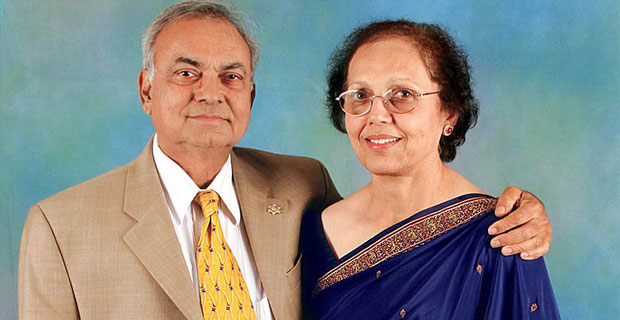Straight from the heart
Wherever you go, go with all your heart. —Confucius
LIFE OVERSEAS, MARRIAGE
It was not just a black and white television set that he saw for the first time in his life after arriving in London. He would witness a new culture from close, a new way of living. Britain would alter Sahota’s way of life, groom him such that he’d become an international thinker, teach him the etiquettes of the west, and allow him to imbibe ethics in his profession. He believes that whatever he is professionally, the heights he’s scaled in cardiology, the numerous recognitions he has received, is because of his stint in the United Kingdom which altogether was to last seven years. He also believes that but for that stint he wouldn’t be half as accomplished as he is today, not by a fair distance.
As an example, one day soon after he arrived in England he visited an instruments store on London’s Gower Street, looking to buy the famous Littman stethoscope. He chose one particular stethoscope, but the man at the counter asked him for a certain number of “quids” which Sahota couldn’t quite comprehend. So he delved into his pocket and flashed out a five pound note, alas it wasn’t quite enough to buy that valuable apparatus. He was short by about ten pounds. The counter man noticed his discomfiture, and stepped in to put him at ease. “You can take the stethoscope and send the money later. You need those five pounds more than me.” Sahota could not believe his ears.
He started out at the Bromsgrove Hospital in England that would turn out to be nothing more than a pit stop during his seven years in England. Sahota had set out to see places, and he was not keen to stay put at any one place for too long. That was why he had flown out of India in the first place.
He landed up in Wakefield near Leeds for training (as Resident) and joined the Casualty (Emergency) Department of Clayton Hospital for a stint that was to last nearly four months and one that included a full-fledged residency in Medicine. In September 1968, he joined the Llangwyfan Hospital in Denbigh in North Wales as a registrar. During his four-year stay at North Wales he was able to take two sabbaticals, the first for a six-month post-graduation course in Tropical Medicine in 1970 at the Liverpool School of Tropical Medicine. Then in 1971 he went to the University of Cardiff to do a post-graduation in Chest Medicine (Pulmonary), the course once again lasting six months.
Even though he was getting well entrenched in the world of medicine, the life of a bachelor was beginning to unsettle him. He was past 30, and the idea of marriage had started germinating in his mind. The shy young man who wouldn’t look girls in the eye at college was now contemplating spending the rest of his life with a woman. He wrote a brief letter to his father saying he was ready to tie the knot, and that his parents should find a girl for him. When he reached Garhdiwala, girl after girl was introduced to the vilayati munda, but he didn’t seem all too impressed, until, of course, he met Asha. She was a young captain in the Indian army and also a medical doctor posted in Delhi. A decision was made that Sahota would marry Asha in England. They married on December 16, 1972, a year after Sahota had to postpone his wedding plans due to the Indo-Pakistan war.











Comments.